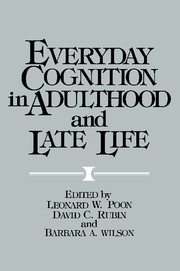Book contents
- Frontmatter
- Contents
- List of contributors
- Preface
- Part I Adult cognitive abilities in the laboratory and in real-life settings: Basic theoretical and methodological issues
- Part IA Systematic approaches to laboratory and real-world research
- 2 Representative design and the quality of generalization
- 3 The myth of external validity
- 4 Functional explanations of memory
- 5 General systems theory: A rationale for the study of everyday memory
- Part IB Combining laboratory and real-world research
- Part II Cognition in adulthood and late life: Findings in real-life settings
- Part IIA Everyday cognitive abilities
- Part IIB Concomitant influences
- Part III Cognitive enhancement and aging: Clinical and educational applications
- Part IIIA Issues and perspectives
- Part IIIB Enhancement approaches
- Part IIIC Designing programs for cognitive rehabilitation
- Subject index
- Author index
4 - Functional explanations of memory
Published online by Cambridge University Press: 05 October 2013
- Frontmatter
- Contents
- List of contributors
- Preface
- Part I Adult cognitive abilities in the laboratory and in real-life settings: Basic theoretical and methodological issues
- Part IA Systematic approaches to laboratory and real-world research
- 2 Representative design and the quality of generalization
- 3 The myth of external validity
- 4 Functional explanations of memory
- 5 General systems theory: A rationale for the study of everyday memory
- Part IB Combining laboratory and real-world research
- Part II Cognition in adulthood and late life: Findings in real-life settings
- Part IIA Everyday cognitive abilities
- Part IIB Concomitant influences
- Part III Cognitive enhancement and aging: Clinical and educational applications
- Part IIIA Issues and perspectives
- Part IIIB Enhancement approaches
- Part IIIC Designing programs for cognitive rehabilitation
- Subject index
- Author index
Summary
For approximately 100 years, psychologists have been conducting scientific research on memory. Such research has been propelled largely by laboratory procedures and data and by theories about laboratory findings. Lately, sentiment has been growing that memory scientists should be more concerned about memory as it operates in natural settings, in other words, about the ecology of memory. A strong advocate of the ecological movement is Ulric Neisser. He has been harshly critical of traditional memory research because it has contributed so little to our understanding of everyday memory (Neisser, 1878). It is not difficult to sympathize with this complaint, but the dilemma is what to do about it. Although most ecologists of memory are rather vague on how to proceed, it is evident that they would like to see more attention to memory problems of the real world and less to procedures and theories resulting from laboratory work (Hirst & Levine, 1985; Neisser, 1978, 1982a). Clearer guidelines are possible, however, if we specify the fundamental questions that memory researchers have asked in the past and show how these could be changed (and indeed already are changing) to yield a broader understanding of memory. In this chapter, I shall describe an ecological orientation that has its roots in Charles Darwin, evolutionary biology, ethology, and the functional psychology of William James. Its objective is to encourage functional explanations of memory. The approach will be illustrated with examples drawn from the current memory literature.
- Type
- Chapter
- Information
- Everyday Cognition in Adulthood and Late Life , pp. 44 - 58Publisher: Cambridge University PressPrint publication year: 1989
- 34
- Cited by



